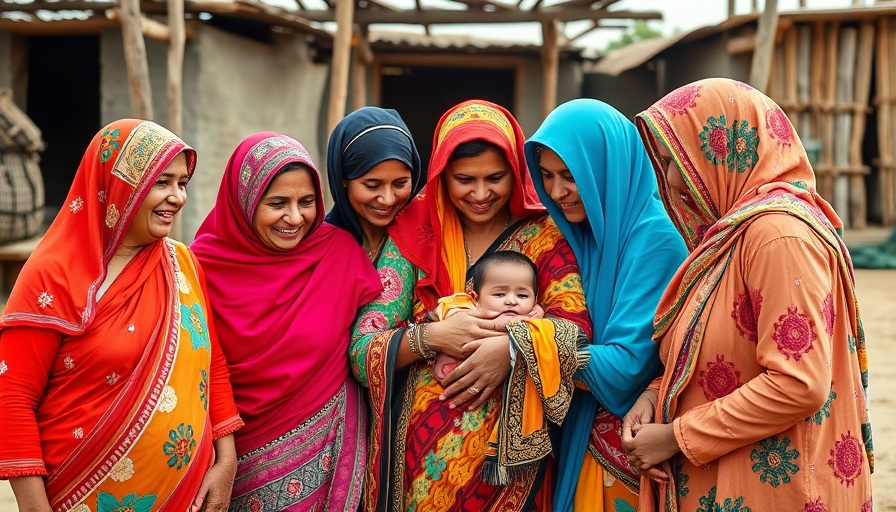
Understanding the Importance of Breastfeeding Policies
Breastfeeding is not just a personal choice; it is a public health imperative recognized by global health organizations. The World Health Organization (WHO) emphasizes that effective breastfeeding policies can significantly improve infant health outcomes by reducing the risk of infections and chronic diseases. In recent years, a growing awareness of the potential long-term benefits of breastfeeding has led to a surge in initiatives aimed at promoting and protecting it.
What is the WBTi and How Can It Transform Breastfeeding Practices?
The World Breastfeeding Trends Initiative (WBTi) offers a robust framework for countries to evaluate and enhance their breastfeeding policies. With achieving positive outcomes in breastfeeding rates and support systems, countries using the WBTi model have shown marked improvements in both policy implementation and funding for breastfeeding initiatives. However, despite having over 100 participating nations since 2005, only a small fraction, approximately 6%, have repeated assessments in the past five years. This statistic underscores the urgency of the recent webinar organized by WHO aimed at increasing the scope and awareness of WBTi assessments.
Parallel Examples of Successful Breastfeeding Policy Implementation
Countries like The Gambia, Bangladesh, Croatia, and El Salvador have successfully implemented the WBTi model to bolster their breastfeeding policies. These nations provide shining examples of how tailored assessments can lead to actionable improvements. For instance, The Gambia has integrated breastfeeding promotion into its overall health strategies, resulting in substantial increases in breastfeeding rates. Learning from these examples can inspire countries lagging in breastfeeding promotions to take action.
Future Trends in Breastfeeding Policies: What Lies Ahead?
By aiming for 75% of countries to conduct policy assessments by 2030, the Global Breastfeeding Collective is setting ambitious goals. This aim signifies a shift towards globally coordinated efforts to protect and promote breastfeeding. As we advance towards this goal, it is essential to consider the trends that will facilitate these changes. A keen focus on data-driven strategies, multi-sectoral partnerships, and the engagement of local communities will be critical.
The Role of Community and Multi-Sectoral Collaboration
Community engagement is paramount for effective breastfeeding policies. The success of initiatives such as the WBTi depends on building core groups that span multiple sectors, including healthcare, education, and social services. By organizing diverse stakeholders, countries can create a supportive infrastructure for breastfeeding that resonates at the community level. The recent WBTi webinar focuses on empowering participants to execute these collaborative strategies.
Steps Toward Effective Change: Actionable Insights from the WBTi Webinar
Participants in the WBTi webinar will gain valuable knowledge, including an understanding of the WBTi methodology and the significance of regular assessments. Furthermore, the session will highlight how to transform assessment findings into actionable strategies that can drive change. By fostering an environment of continuous learning and improvement, the WBTi methodology equips nations with the tools necessary to enhance breastfeeding practices and health outcomes.
Emotional Connection: The Values and Benefits of Breastfeeding
At its core, breastfeeding is about nurturing and caring for our newest society members. The emotional bond fostered through breastfeeding not only benefits infants but also enhances the quality of life for mothers. Public health initiatives that prioritize breastfeeding acknowledge the profound impact these practices have on family and community health. Investing in breastfeeding policies is an investment in the future, nurturing the next generation’s health and well-being.
Closing Thoughts and a Call to Action
The upcoming WBTi webinar presents a vital opportunity for nations to step up their efforts in supporting breastfeeding through robust policies. As participants learn to conduct assessments and create actionable strategies, they will be empowered to take proactive steps toward improving breastfeeding rates. Communities stand to gain immensely from the insights shared during this session, fostering healthier practices that ultimately benefit society as a whole. Let’s embrace the call to action and drive forward the conversation on protecting and promoting breastfeeding globally.
 Add Row
Add Row  Add
Add 




Write A Comment